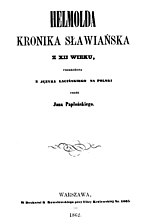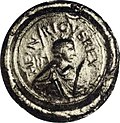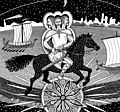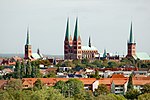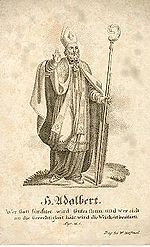Polabian Slavs, also known as Elbe Slavs and more broadly as Wends, is a collective term applied to a number of Lechitic (West Slavic) tribes who lived...
23 KB (2,656 words) - 19:34, 12 October 2024
Slavic paganism (redirect from Polabian religion)
practices of the Slavs before Christianisation, which occurred at various stages between the 8th and the 13th century. The South Slavs, who likely settled...
72 KB (9,083 words) - 12:46, 27 October 2024
The Novgorod Slavs, Ilmen Slavs (Russian: Ильменские словене, Il'menskiye slovene), or Slovenes (not to be confused with the South Slavic Slovenes) were...
3 KB (357 words) - 01:47, 8 November 2024
Slovakization East Slavs South Slavs Outline of Slavic history and culture Ilya Gavritukhin, Vladimir Petrukhin (2015). Yury Osipov (ed.). Slavs. Great Russian...
17 KB (1,515 words) - 14:07, 13 November 2024
Svarozhits (section Polabian Slavs)
Perkune dievaite). Svarozhits first appears in a text concerning the Polabian Slavs. The Christian monk Bruno of Querfurt, in a letter to king Henry II...
18 KB (2,200 words) - 21:36, 6 November 2024
Obotrites (category West Slavs)
territory of modern Mecklenburg and Holstein in northern Germany (see Polabian Slavs). For decades, they were allies of Charlemagne in his wars against the...
12 KB (759 words) - 10:48, 21 October 2024
was spoken by the Polabian Slavs (German: Wenden) in present-day northeastern Germany around the Elbe, from which the term Polabian comes from. It was...
51 KB (4,271 words) - 21:40, 17 November 2024
Zhrets (section Polabian Slavs)
West Slavs it is attested only in Polish. Most information about the Slavic priesthood comes from Latin texts about the paganism of the Polabian Slavs. The...
19 KB (2,227 words) - 01:30, 12 September 2024
List of Slavic pseudo-deities (section Polabian Slavs)
deemed actually to have been objects of worship among pagan Slavs. The pseudo-deities of the Slavs, like those of other ethnic groups, were created as a result...
26 KB (2,744 words) - 05:36, 25 October 2024
The Slavs or Slavic people are groups of people who speak Slavic languages. Slavs are geographically distributed throughout the northern parts of Eurasia;...
106 KB (9,266 words) - 05:51, 11 November 2024
the chief god of the Slavic tribe of the Rani, and later of all the Polabian Slavs. His organized cult was located on the island of Rügen, at Cape Arkona...
50 KB (6,451 words) - 14:54, 28 October 2024
cultures of Slavic Europe. East Slavs: Culture of Belarus Culture of Russia Culture of Kievan Rus' Culture of Ukraine South Slavs: Culture of Bosnia and Herzegovina...
868 bytes (87 words) - 19:48, 13 October 2024
Oder River) branches of the Polabian Slavs. In 963 Margrave Gero of Meissen conquered territories occupied by the Polabian Lusatian and Słupian tribes...
49 KB (6,591 words) - 01:03, 17 November 2024
Veleti (category Polabian Slavs)
Lechitic tribes within the territory of Western Pomerania, related to Polabian Slavs. They had formed together the Confederation of the Veleti, also known...
8 KB (731 words) - 18:17, 30 May 2024
(died 1154) and Gerold (died 1163), who did much to Christianize the Polabian Slavs. Helmold was born near Goslar. He grew up in Holstein, and received...
5 KB (650 words) - 08:46, 26 September 2024
Chronica Slavorum (redirect from Chronicle of the Slavs)
Sclavorum or Chronicle of the Slavs is a medieval chronicle which recounts the pre-Christian culture and religion of the Polabian Slavs, written by Helmold (c...
2 KB (131 words) - 12:33, 8 April 2024
Henry the Fowler (section Wars with Slavs)
Henry's kingdom. During the truce with the Magyars, Henry subdued the Polabian Slavs who lived on his eastern borders. In the winter of 928 he marched against...
26 KB (3,262 words) - 04:04, 19 November 2024
of one of the tribes belonging to the Obodritic confederation of the Polabian Slavs. The goddess so appears only in the Chronicle of Helmold of Bozov. He...
4 KB (447 words) - 06:36, 25 October 2024
one") was the chief god of the Pomeranian and probably some of the Polabian Slavs, worshipped in Szczecin, Wolin and probably Brenna (now Brandenburg)...
24 KB (3,291 words) - 13:01, 25 October 2024
"Lübeck" ultimately stems from the Slavic root lub- ("love-"). Before 819, Polabian Slavs founded a settlement which they called Liubice on the mouth of the Schwartau...
53 KB (5,421 words) - 04:16, 16 November 2024
Adalbert of Magdeburg (redirect from Adalbert Apostle of the Slavs)
as the Apostle of the Slavs, was the first Archbishop of Magdeburg (from 968) and a successful missionary to the Polabian Slavs to the east of what was...
7 KB (508 words) - 04:44, 19 May 2024
suffix -ov, -ów). Examples: village and town names' suffixes on former Polabian Slavs territories: Lübbenau, Plau. See also: German naming convention of Polish...
17 KB (1,814 words) - 02:30, 1 November 2024
Hungarians in order to Christianize the Polabian Slavs but it had been effectively destroyed in 983 with the Great Slav Rising following the death of Otto...
54 KB (7,221 words) - 18:56, 6 November 2024
Slavic revolt of 983 (redirect from Great Slav Rising)
In the Slavic revolt of 983, Polabian Slavs, Wends, Lutici and Obotrite tribes, that lived east of the Elbe River in modern north-east Germany overthrew...
7 KB (765 words) - 19:43, 5 October 2024
Age, the area was probably inhabited by Germanic Rugians, before the Polabian Slavs moved in during the fifth, sixth, and seventh centuries. Around the...
15 KB (1,452 words) - 05:33, 21 October 2024
Wendish Crusade (category Polabian Slavs)
Kingdom of Germany within the Holy Roman Empire and directed against the Polabian Slavs (or "Wends"). The Wends were made up of the Slavic tribes of Abrotrites...
19 KB (2,194 words) - 21:36, 23 October 2024
Rethra (category Polabian Slavs)
Rethra (also known as Radagoszcz, Radegost, Radigast, Redigast, Radgosc and other forms like Ruthengost) was, in the 10th to the 12th centuries, the main...
10 KB (1,318 words) - 00:36, 12 September 2024
The pagan Slavs were polytheistic, which means that they worshipped many gods and goddesses. The gods of the Slavs are known primarily from a small number...
34 KB (2,196 words) - 02:33, 29 August 2024
Radegast or Radogost is, according to medieval chroniclers, the god of the Polabian Slavs, whose temple was located in Rethra. In modern academic literature,...
23 KB (2,380 words) - 10:22, 25 October 2024
had started several eastern campaigns into the adjacent lands of the Polabian Slavs, homeland of Wenceslaus's mother. To withstand Saxon overlordship, Wenceslaus's...
23 KB (2,510 words) - 18:23, 10 November 2024











